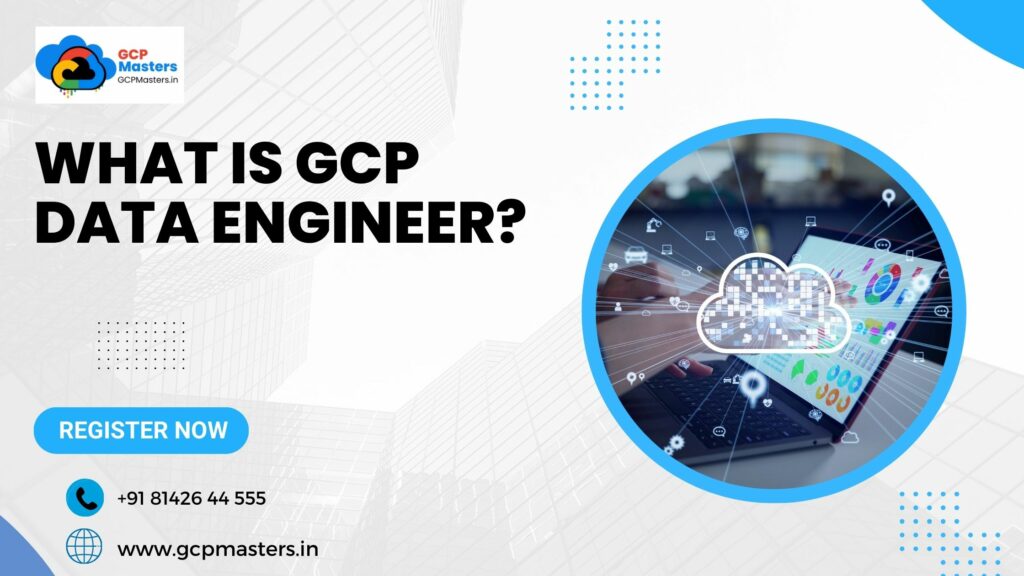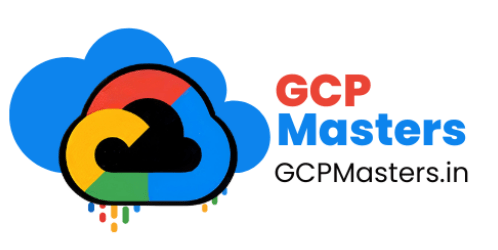What is GCP Data Engineer?
Last updated 21.june.2024

A Google Cloud Platform (GCP) Data Engineer is a professional responsible for designing, building, and maintaining data processing systems on Google Cloud. They work with various GCP services like BigQuery, Cloud Dataflow, Cloud Dataproc, and other related tools to develop scalable and efficient data pipelines. These pipelines are crucial for ingesting, transforming, and analyzing large volumes of data to derive valuable insights for businesses. GCP Data Engineers possess expertise in data modeling, ETL (Extract, Transform, Load) processes, and data warehousing techniques, enabling them to create robust architectures that meet the organization’s data needs.
Additionally, GCP Data Engineers collaborate closely with data scientists, analysts, and other stakeholders to understand their requirements and translate them into technical solutions. They play a vital role in ensuring data quality, integrity, and security throughout the data lifecycle. This often involves implementing best practices for data governance, compliance, and privacy regulations. Overall, GCP Data Engineers contribute significantly to an organization’s data strategy by leveraging Google Cloud’s powerful infrastructure and services to drive data-driven decision-making and innovation.
The Role of a Data Engineer
A Data Engineer is a key player in any data-centric organization, responsible for developing, constructing, testing, and maintaining architectures such as databases and large-scale processing systems. Their primary goal is to ensure that data is accessible, reliable, and ready for analysis by data scientists and business analysts.
Key Responsibilities:
1. Data Pipeline Development:
Design, create, and manage robust data pipelines that collect, transform, and load data from various sources into a centralized data warehouse or data lake.
2. Data Integration:
Integrate data from different sources, ensuring consistency and accuracy. This often involves working with APIs, ETL tools, and various data integration techniques.
3. Database Management:
Design and optimize databases to ensure efficient storage, retrieval, and processing of data. This includes setting up indexing, partitioning, and other performance tuning measures.
4. Data Cleaning and Transformation:
Implement processes to clean and transform raw data into usable formats. This involves dealing with missing data, outliers, and ensuring data quality.
5. Automation and Orchestration:
Automate repetitive data tasks and orchestrate complex workflows using tools like Apache Airflow, ensuring that data pipelines run smoothly and efficiently.
6. Monitoring and Maintenance:
Continuously monitor data pipelines and systems for performance issues and errors, implementing solutions to ensure data reliability and availability.
7. Collaboration:
Work closely with data scientists, analysts, and business stakeholders to understand data requirements and deliver solutions that meet business needs.
8. Documentation and Best Practices:
Maintain comprehensive documentation of data processes, systems, and architectures. Follow industry best practices to ensure data security, compliance, and governance.
Essential Skills and Tools:
1. Programming Languages:
Proficiency in SQL, Python, Java, or Scala for building data processing and ETL pipelines.
2. Data Warehousing Solutions:
Experience with data warehousing solutions like Google BigQuery, Amazon Redshift, or Snowflake.
3. Big Data Technologies:
Familiarity with Hadoop, Spark, and Kafka for handling large-scale data processing.
4. ETL Tools:
Knowledge of ETL tools such as Apache Nifi, Talend, or Informatica for data extraction, transformation, and loading.
5. Cloud Platforms:
Expertise in cloud platforms like GCP, AWS, or Azure, leveraging their services for data storage, processing, and analysis.
6. Data Modeling:
Ability to design and implement data models that support efficient querying and analysis.
7. Problem-Solving:
Strong analytical and problem-solving skills to troubleshoot data issues and optimize performance.
Impact on Business:
1. Enhanced Data Accessibility:
By ensuring that data is well-organized and accessible, Data Engineers enable quicker and more accurate data analysis, supporting informed decision-making.
2. Improved Data Quality:
Through rigorous cleaning and validation processes, Data Engineers ensure that the data used by the organization is reliable and of high quality.
3.Scalable Solutions:
They build scalable data architectures that can handle growing data volumes and evolving business requirements.
4.Operational Efficiency:
Automation of data processes reduces manual intervention, minimizes errors, and enhances operational efficiency.
GCP Services for Data Engineers
Google Cloud Platform (GCP) offers a comprehensive suite of services that empower Data Engineers to build, manage, and analyze large-scale data solutions efficiently. Here are some key GCP services tailored for Data Engineers
1. BigQuery:
A fully-managed, serverless data warehouse that enables fast SQL queries using Google’s infrastructure.
Key Features
- Scalability: Easily scale your data warehouse to petabyte-scale datasets with no infrastructure management required.
- Fast Query Performance: Execute complex analytical queries in seconds, thanks to Google’s powerful infrastructure.
- Integration: Seamlessly integrate with other GCP services and popular BI tools like Tableau, Looker, and Data Studio.
2. Dataflow
A fully-managed, serverless data processing service for both batch and stream processing tasks.
Key Features:
- Unified Programming Model: Use the Apache Beam SDK to write data processing pipelines once and execute them in both batch and streaming modes.
- Autoscaling: Automatically scale processing resources up or down based on the volume of incoming data, ensuring efficient resource utilization.
- Integration: Integrate with various data sources and sinks, including BigQuery, Cloud Storage, Pub/Sub, and more.
3. Dataprep
An intelligent data preparation service that helps clean, enrich, and transform raw data using machine learning techniques.
Key Features:
- Visual Data Preparation: Clean and transform data using an intuitive, visual interface, without writing any code.
- Automated Data Profiling: Automatically detect and visualize data quality issues, outliers, and anomalies in your datasets.
- Integration: Seamlessly integrate with other GCP services like BigQuery and Dataflow for further analysis and processing.
4.Pub/Sub
A fully-managed messaging service for building event-driven systems and real-time data processing pipelines.
Key Features:
- Scalability: Handle millions of events per second with low latency, making it suitable for real-time data ingestion and processing.
- Durability: Ensure reliable message delivery with built-in message retention and replay capabilities.
- Integration: Integrate with various GCP services and external systems using client libraries and connectors.
5.Bigtable
A scalable, fully-managed NoSQL database service for real-time analytics and high-throughput applications.
Key Features:
- Scalability: Scale seamlessly to handle petabytes of data with low latency and high throughput.
- High Availability: Ensure high availability and durability with automatic replication and failover capabilities.
- Integration: Integrate with other GCP services like Dataflow and Dataproc for analytics and processing tasks.
6.AI Platform
A suite of managed services and tools for building, training, and deploying machine learning models at scale.
Key Features:
- Model Training: Train machine learning models using distributed training on scalable infrastructure.
- Model Serving: Deploy trained models as RESTful APIs for real-time predictions and inference.
- Integration: Integrate with other GCP services like BigQuery and Dataflow for data preprocessing and feature engineering.
7.Cloud Storage
scalable, fully-managed object storage service for storing and accessing data in the cloud.
Key Features:
- Scalability: Store petabytes of data with high durability and availability, suitable for a wide range of use cases.
- Integration: Integrate with other GCP services like BigQuery, Dataflow, and AI Platform for data processing and analysis tasks.
- Cost-Effectiveness: Choose from different storage classes based on your data access patterns and cost requirements.
Data Engineering Best Practices
Data Ingestion: Bringing Data into Your Ecosystem
Data ingestion is the process of importing data from various sources into your data system.
- Design Scalable Pipelines: Use Dataflow and Pub/Sub to handle large volumes of incoming data. These services automatically scale to match the data load, ensuring smooth ingestion.
- Ensure Data Quality: Implement validation checks to maintain the accuracy and consistency of ingested data. This can be done using Dataflow’s powerful data transformation capabilities.
- Handle Diverse Data Sources: Use connectors and APIs to ingest data from various sources, including databases, APIs, and streaming platforms. GCP offers a wide range of connectors to make this process seamless.
Data Transformation and Processing: Making Data Useful
Once data is ingested, it often needs to be transformed and processed to make it useful.
- Use Unified Processing Models: Leverage Apache Beam with Dataflow for both batch and stream processing. This provides a consistent approach to data transformation.
- Optimize Performance: Implement efficient data transformation logic to minimize processing time and resource usage. This can involve using optimized data formats and parallel processing techniques.
- Maintain Data Lineage: Track data transformations to ensure transparency and traceability. This is crucial for debugging and understanding data flow within your systems.
Data Storage: Keeping Data Safe and Accessible
Storing data effectively is crucial for any data engineering project
- Choose the Right Storage Solution: Select appropriate storage services based on data type and usage patterns. For instance, use BigQuery for structured data, Cloud Storage for unstructured data, and Bigtable for high-throughput, low-latency access.
- Implement Data Partitioning: Use partitioning and clustering in BigQuery to optimize query performance. This can significantly reduce query times and improve overall efficiency.
- Ensure Data Security: Apply encryption, access controls, and audit logging to protect sensitive data. GCP provides robust security features to safeguard your data.
Conclusion
Google Cloud Platform (GCP) provides Data Engineers with a powerful set of tools and services to design, build, and manage data solutions at scale. From real-time data processing with Dataflow to lightning-fast analytics with BigQuery, GCP offers a comprehensive suite of services tailored to meet the evolving needs of modern data engineering workflows.
By leveraging GCP’s managed services, Data Engineers can focus on innovating and solving complex data challenges without worrying about infrastructure management. Whether it’s building data pipelines, cleaning and transforming data, or training machine learning models, GCP empowers Data Engineers to turn data into actionable insights that drive business growth and innovation.
As organizations increasingly rely on data to make informed decisions, the role of Data Engineers becomes more critical than ever. With GCP’s effective ecosystem of services, Data Engineers can unleash the full potential of their data, enabling their organizations to stay ahead in today’s data-driven world.
FAQ'S
Related to GCP Data Engineer
A proficient Gcp data engineer is responsible for designing systems for data collection and navigation. Building data pipelines requires solid expertise in various data storage systems and frameworks, and the application of data engineering principles through the Google Cloud Platform is a key responsibility of a GCP data engineer.
The average annual income for a GCP Data Engineer in India is ₹8.0 Lakhs, with a salary range of ₹4.0 Lakhs to ₹19.0 Lakhs.
The responsibilities of an Associate Cloud Engineer at GCP involve managing corporate solutions, overseeing operations, and installing applications.
Developing and honing coding language proficiency is recommended for this position, and enrolling in classes can help you achieve that.
- The average pay for a TCS GCP Data Engineer in Hyderabad/Secunderabad is ₹5.6 Lakhs.
- The salary range for a GCP Data Engineer at TCS Hyderabad/Secunderabad is ₹3.6 Lakhs to ₹9.0 Lakhs.
The Gcp Data Engineer salary range at Accenture Hyderabad/Secunderabad is ₹3.8 Lakhs to ₹10.2 Lakhs.
To secure a position as a Google Data Engineer, a degree in computer science, statistics, informatics, information systems, or a related quantitative field is required.
SQL is a popular choice for data engineering due to its efficiency and transparency in database interaction. It is utilized for various data management tasks, including creating and modifying tables, views, and other database objects.
Google Cloud provides multiple options, including serverless, Kubernetes, virtual machines, and custom hardware, allowing you to choose the optimal environment for running your Python applications.
- Cisco Systems Data Engineers receive an average salary of $196,939 per year based on 1,043 reported salaries.
- Data engineers jobs at Amazon, IBM, and Capital One report average salaries of $140,142, $126,466, and $127,426, respectively.
Prepare for the Data Engineer Interview by:
- Learning SQL: Gain experience in building, modifying, and managing databases.
- Addressing coding challenges: Coding skills are crucial for data engineers.
- Practice designing ETL pipelines by creating data, ETL, or delivery pipelines.

